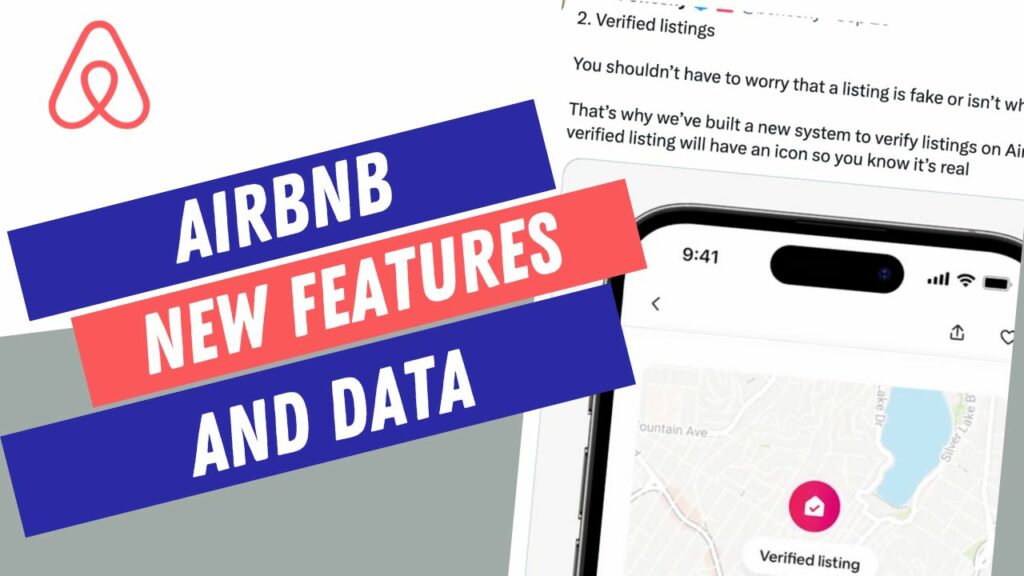In an unexpected move, Airbnb’s CEO, Brian Chesky, recently took to Twitter, sidestepping the company’s traditional Winter and Summer announcement cycles. For avid travelers and hosts alike, these updates come as a mix of curiosity and anticipation. Chesky’s tweets shed light on a few significant product improvements and initiatives as the platform seeks to address previous criticisms and bolster its image. Whether it’s an effort to offer a more affordable travel option or enhanced safety measures, here’s a look at what’s making headlines in the Airbnb world.
100% Verified Listings (as already promised in 2019)
Contrary to what some news outlets might suggest, this isn’t the first time Airbnb has promised 100% listing verifications. Flashback to November 6, 2019, when Airbnb’s CEO, Brian Chesky, shared an open letter, aptly titled “In the business of trust”. This pledge to ensure safety came in the aftermath of a devastating incident on October 31, 2019. A tragic shooting in California’s Bay Area, resulting in four fatalities and multiple injuries, combined with a scandalous revelation by a VICE reporter about a rampant “fake host” scam, compelled Airbnb to reevaluate its security measures. Chesky’s subsequent announcement highlighted four vital steps: 100% listing verification, a guest satisfaction guarantee, the inception of a Neighbor Hotline, and a meticulous review of dubious reservations and hosts.
Fast forward to September 2023, Brian Chesky has reiterated Airbnb’s commitment to verifying all its listings. In a significant move to bolster its trustworthiness, the company has recently prevented 157,000 counterfeit listings from entering the platform and axed 59,000 that had previously bypassed their initial scrutiny.
As per Chesky’s announcement, the verification initiative will initially roll out in strategic countries, including the U.S., Canada, Australia, the U.K., and France. Airbnb aims to broaden this program to an additional 30 countries by the following fall. The essence of this effort? Ensuring that each listing is genuinely situated where it professes to be.
For newcomers to the platform wondering about the verification process, there are four distinct methods to authenticate a listing’s address:
- Share Your Device Location: By granting access to the precise GPS location from one’s mobile device, if the gadget’s GPS coordinates align closely with the listing’s specified location, the address stands confirmed. This method seems to be the favored mode of verification in this announcement.
- Upload a Listing Photo: A simple act of uploading a photograph taken at the listing’s venue. If the picture indeed represents the location, it will pass verification.
- Documentation: Owners can submit a relevant document (less than 2 years old and unaltered) that legally ties them to the listing address. Whether it’s a utility bill, lease agreement, or a property tax document, as long as it distinctly displays the full listing address and adheres to Airbnb’s file size and format requirements, it’s valid for review.
- Security Code: Involves a postal verification. Airbnb will dispatch a letter encompassing a unique security code, which the listing owner must input online within 60 days. There are prerequisites, such as the listing accepting official postal service mail and retrieval of the mail within the stipulated period.
For established listings, the evaluation hinges on sifting through past guest feedback, pinpointing any alarming remarks or inconsistencies concerning the property’s actual location. Once a listing clears this rigorous examination, it will proudly display a “verified” badge, commencing in February.
Airbnb’s Adaptive Search: Offering Alternative Dates When Supply is Limited
When searching for accommodations during peak periods in sought-after locations, you might find limited options on Airbnb. To counter this challenge and retain potential guests, Airbnb now recommends alternative listings on nearby dates where availability exists. The aim of this feature is to keep users engaged on the platform and encourage them to book, especially if they can adjust their travel dates.
Similar to the “Flexible Search” feature, where Airbnb displays listings that might not meet all specific amenity criteria, the platform’s goal is to channel demand to dates and locations with available supply. This tool proves particularly useful in regions where Airbnb experiences a scarcity of listings, whether due to seasonal surges or changes in local regulations. During peak seasons or in restricted areas where Airbnb’s offerings dwindle, both the Flexible Search and the suggestion of alternate options play a pivotal role in enhancing booking conversion rates.
Enhanced Filter Additions: Boosting Conversions with Pet-Friendly Stays and King-Sized Beds
When users dive into Airbnb’s search, they’re met with filters that act like a personalized checklist to pinpoint their perfect stay. The filters span from specific home amenities to property types and host languages. Given the vast sea of potential filters, Airbnb doesn’t just throw anything into the mix. They select based on two factors: user feedback and conversion rates.
It’s more than just adding what users are talking about. Before introducing a new filter, Airbnb likely conducts meticulous A/B testing. This testing is crucial to understand if adding a particular filter not only satisfies users but more importantly, drives them to book a stay.
This scientific approach is likely why “Pet-Friendly Home” and “King-Size Bed” have been introduced. The addition of these filters suggests a couple of insights:
- A substantial number of guests have shown interest in these features.
- Listings offering these amenities probably lead to more completed bookings.
Moreover, the prominence of the pet-friendly option, now sitting alongside significant choices like instant booking or free cancellation, indicates a growing trend in pet travel, as notices since the COVID-19 pandemic. For hosts, this analytical update is a cue: these features could be your ticket to higher guest bookings!
Making Airbnb More Affordable: Lower Night Rates and Cleaning Fees
In an effort to counter its reputation as a pricier travel option since 2022, Airbnb has implemented various strategies. From highlighting more affordable Airbnb Rooms (individual rooms within hosts’ homes) to increasing its listing supply to potentially drive down prices, the platform has been active. However, Airbnb acknowledges that the benefits of these changes might become more evident next year.
Brian Chesky, shedding light on these efforts, mentioned, “Since introducing our total price display feature, 260,882 listings have either reduced or eliminated their cleaning fees. Currently, close to 3 million listings don’t charge a cleaning fee. While hotel prices have surged by 10% compared to last year, the average cost of a 1-bedroom Airbnb has decreased by 1%. We’re planning further updates this autumn to make Airbnb even more wallet-friendly.”
Cleaning fees have often been a point of debate on platforms like social media, with some Airbnb users lamenting the steep charges and, paradoxically, being given a list of tasks to complete before checking out. To address this and motivate hosts to minimize or forego cleaning fees, Airbnb now shows the all-inclusive price early in the booking process. While this is a significant move in the US, especially in light of the ongoing “war against junk fees,” it’s worth noting that Airbnb has been practicing this transparent pricing in Europe for years, adhering to European Union regulations promoting price clarity. Thus, this change might predominantly influence the US market.
When it comes to the 1% drop in the average price for 1-bedroom Airbnb homes, especially against a backdrop of a 10% rise in hotel prices, the specifics are a bit nebulous. Airbnb hasn’t clarified which regions this data pertains to. Is it exclusive to the US market? In certain areas, an oversupply of listings coupled with fluctuating demand might have contributed to the drop in prices. Moreover, it’s essential to understand that 1-bedroom Airbnb homes are in direct competition with hotels. In contrast, larger listings, like a 4-bedroom house, face significantly less pricing competition from the traditional hotel industry.
Improved Customer Support
Brian Chesky acknowledged user feedback regarding calling Airbnb, where long wait times were common and callers often had to explain their issues to multiple representatives. He stated that currently, 94% of calls are answered within two minutes. Starting from November, Airbnb aims to connect callers directly to agents specialized in addressing their specific concerns, ensuring faster resolution.







![Trump-Era Policies Fuel Travel Uncertainty: Fewer Canadians, Europeans to U.S.—Fewer Americans to Europe [Early Data]](https://www.rentalscaleup.com/wp-content/uploads/2025/04/Trump-Era-Policies-Fuel-Travel-Uncertainty-Fewer-Canadians-Europeans-to-U.S.—Fewer-Americans-to-Europe-Early-Data-150x150.jpg)
